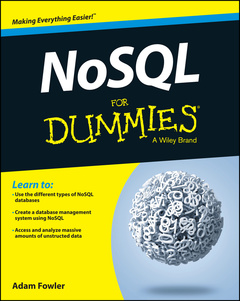NoSQL For Dummies
Auteur : Fowler Adam

This easy to read guide to NoSQL databases provides the type of no-nonsense overview and analysis that you need to learn, including what NoSQL is and which database is right for you. Featuring specific evaluation criteria for NoSQL databases, along with a look into the pros and cons of the most popular options, NoSQL For Dummies provides the fastest and easiest way to dive into the details of this incredible technology. You'll gain an understanding of how to use NoSQL databases for mission-critical enterprise architectures and projects, and real-world examples reinforce the primary points to create an action-oriented resource for IT pros.
If you're planning a big data project or platform, you probably already know you need to select a NoSQL database to complete your architecture. But with options flooding the market and updates and add-ons coming at a rapid pace, determining what you require now, and in the future, can be a tall task. This is where NoSQL For Dummies comes in!
- Learn the basic tenets of NoSQL databases and why they have come to the forefront as data has outpaced the capabilities of relational databases
- Discover major players among NoSQL databases, including Cassandra, MongoDB, MarkLogic, Neo4J, and others
- Get an in-depth look at the benefits and disadvantages of the wide variety of NoSQL database options
- Explore the needs of your organization as they relate to the capabilities of specific NoSQL databases
Big data and Hadoop get all the attention, but when it comes down to it, NoSQL databases are the engines that power many big data analytics initiatives. With NoSQL For Dummies, you'll go beyond relational databases to ramp up your enterprise's data architecture in no time.
Introduction 1
Part I: Getting Started with NoSQL 5
Chapter 1: Introducing NoSQL: The Big Picture 7
Chapter 2: NoSQL Database Design and Terminology 27
Chapter 3: Evaluating NoSQL 59
Part II: Key-Value Stores 95
Chapter 4: Common Features of Key-Value Stores 97
Chapter 5: Key-Value Stores in the Enterprise 105
Chapter 6: Key-Value Use Cases 111
Chapter 7: Key-Value Store Products 117
Chapter 8: Riak and Basho 133
Part III: Bigtable Clones 139
Chapter 9: Common Features of Bigtables 141
Chapter 10: Bigtable in the Enterprise 153
Chapter 11: Bigtable Use Cases 165
Chapter 12: Bigtable Products 171
Chapter 13: Cassandra and DataStax 193
Part IV: Document Databases 199
Chapter 14: Common Features of Document Databases 201
Chapter 15: Document Databases in the Enterprise 213
Chapter 16: Document Database Use Cases 221
Chapter 17: Document Database Products 233
Chapter 18: MongoDB 251
Part V: Graph and Triple Stores 257
Chapter 19: Common Features of Triple and Graph Stores 259
Chapter 20: Triple Stores in the Enterprise 275
Chapter 21: Triple Store Use Cases 283
Chapter 22: Triple Store Products 293
Chapter 23: Neo4j and Neo Technologies 309
Part VI: Search Engines 315
Chapter 24: Common Features of Search Engines 317
Chapter 25: Search Engines in the Enterprise 327
Chapter 26: Search Engine Use Cases 335
Chapter 27: Types of Search Engines 341
Chapter 28: Elasticsearch 353
Part VII: Hybrid NoSQL Databases 359
Chapter 29: Common Hybrid NoSQL Features 361
Chapter 30: Hybrid Databases in the Enterprise 369
Chapter 31: Hybrid NoSQL Database Use Cases 375
Chapter 32: Hybrid NoSQL Database Products 381
Chapter 33: MarkLogic 389
Part VIII: The Part of Tens 399
Chapter 34: Ten Advantages of NoSQL over RDBMS 401
Chapter 35: Ten NoSQL Misconceptions 407
Chapter 36: Ten Reasons Developers Love NoSQL 413
Index 419
Primary: CIOs and IT decision makers looking to understand NoSQL databases and ensure that the technology is ready for enterprise, mission–critical systems, and IT architects looking for evaluation criteria, common issues, and advice on approaches for particular technical issues. Secondary: Professional developers looking to understand an increasingly popular technology and to gain an understanding on how to apply NoSQL solutions to new application development problems.
Adam Fowler is a principal sales engineer with MarkLogic, Inc. He has previously worked for IPK, FileNet, and IBM as well as smaller companies. Adam writes for and runs a popular blog on NoSQL and big data, which is republished on DZone.com. He’s a frequent speaker at NoSQL conferences.
Date de parution : 02-2015
Ouvrage de 464 p.
18.8x23.6 cm
Thème de NoSQL For Dummies :
Mots-clés :
NoSQL For Dummies; Adam Fowler; big data; Not Only SQL; non-relational database; scalable database; distributed database; MongoDB; Cassandra; Riak; MarkLogic; Neo4j; commercial NoSQL; BigTable; Basho Technologies; NanoTechnology; 10gen; Gartner NoSQL Magic Quadrant; NoSQL pros and cons; NoSQL evaluation criteria; emerging technology; big data database; enterprise NoSQL; NoSQL selection criteria; graph database; key/value database; column store database; open-source NoSQL; open-source database



